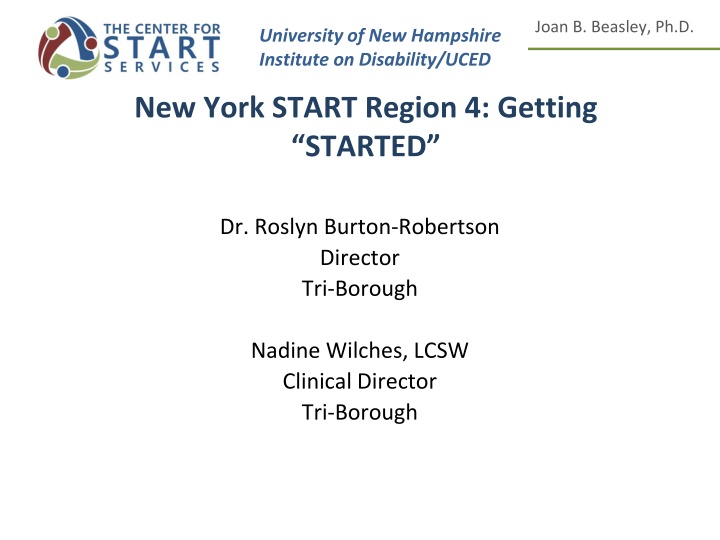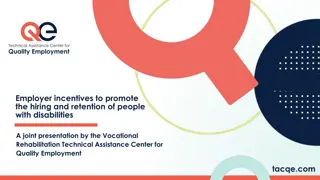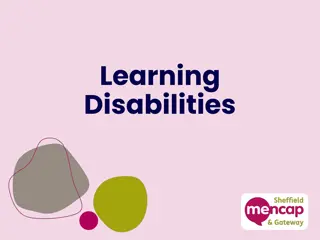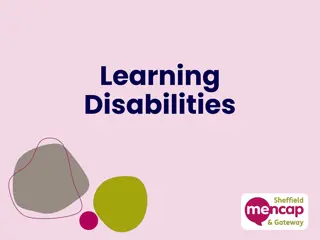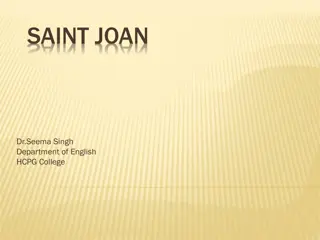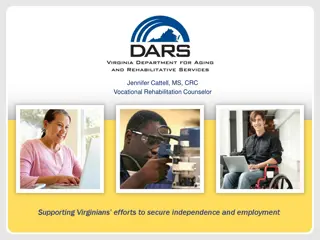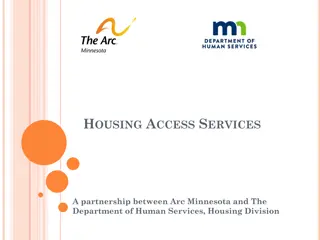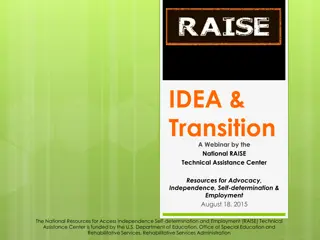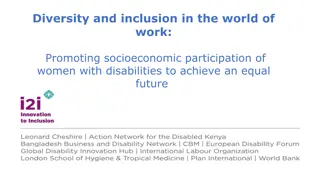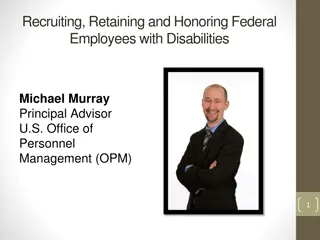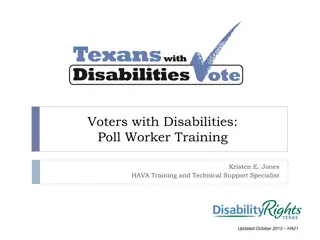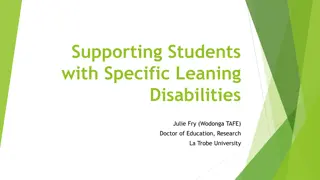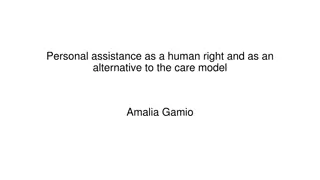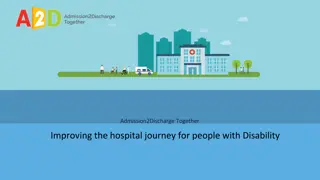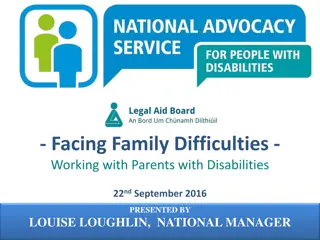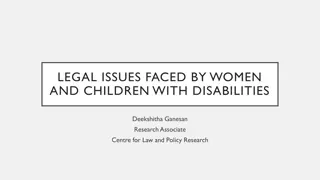Joan B. Beasley, Ph.D.: Enhancing Services for Individuals with Disabilities
Dr. Joan B. Beasley, from the University of New Hampshire Institute on Disability, leads the START program, focusing on crisis intervention for individuals with intellectual/developmental disabilities and mental health needs. The program emphasizes a person-centered, solutions-focused approach and employs positive psychology and evidence-based practices. Essential components include expertise, family support, therapeutic resources, and cross-system crisis prevention. Dr. Beasley emphasizes systemic change and the implementation of learning communities at various levels to strengthen services and outcomes for the community.
Download Presentation

Please find below an Image/Link to download the presentation.
The content on the website is provided AS IS for your information and personal use only. It may not be sold, licensed, or shared on other websites without obtaining consent from the author.If you encounter any issues during the download, it is possible that the publisher has removed the file from their server.
You are allowed to download the files provided on this website for personal or commercial use, subject to the condition that they are used lawfully. All files are the property of their respective owners.
The content on the website is provided AS IS for your information and personal use only. It may not be sold, licensed, or shared on other websites without obtaining consent from the author.
E N D
Presentation Transcript
Joan B. Beasley, Ph.D. University of New Hampshire Institute on Disability/UCED New York START Region 4: Getting STARTED Dr. Roslyn Burton-Robertson Director Tri-Borough Nadine Wilches, LCSW Clinical Director Tri-Borough
Joan B. Beasley, Ph.D. University of New Hampshire Institute on Disability/UCED The START Model Systemic Therapeutic Assessment Resource Treatment
Joan B. Beasley, Ph.D. University of New Hampshire Institute on Disability/UCED Systemic, Therapeutic, Assessment, Resources & Treatment (START) The Center for START Services is a national initiative that strengthens efficiencies and service outcomes for individuals with intellectual/developmental disabilities and behavioral health needs in the community. The START program model was implemented in 1988 by Dr. Joan Beasley and her team to provide community-based crisis intervention for individuals with IDD and mental health needs. It is a person-centered, solutions-focused approach that employs positive psychology and other evidence-based practice.
Joan B. Beasley, Ph.D. University of New Hampshire Institute on Disability/UCED System Change Agents "The measure of intelligence is the ability to change." ~ Einstein
Joan B. Beasley, Ph.D. University of New Hampshire Institute on Disability/UCED Essential Components of the Model Linkages Expertise, training Family support and education Planned and emergency therapeutic resources (respite services) Cross-systems crisis prevention and intervention planning Employs evidence-informed practices and outcome measures (advisory council, clinical team, data analysis) Learning communities, local, regional, statewide, national
Joan B. Beasley, Ph.D. University of New Hampshire Institute on Disability/UCED Positive Psychology (strength-based/ person-centered) We believe that persons who carry even the weightiest psychological burdens care about much more in their lives than just the relief of their suffering. Troubled persons want more satisfaction, contentment, and joy, not just less sadness and worry. Duckworth, Steen, & Seligman, 2005 6
Joan B. Beasley, Ph.D. University of New Hampshire Institute on Disability/UCED The 3 A s Access ( timely, available) Appropriateness (matches real needs, provides tools) Accountability ( responsiveness, engaging, flexible, creative) 3/18/2016
Joan B. Beasley, Ph.D. University of New Hampshire Institute on Disability/UCED Access
Joan B. Beasley, Ph.D. University of New Hampshire Institute on Disability/UCED Appropriateness
Joan B. Beasley, Ph.D. University of New Hampshire Institute on Disability/UCED Accountability
Joan B. Beasley, Ph.D. University of New Hampshire Institute on Disability/UCED Tertiary WHO Approach Primary: Capacity building; communication and collaboration, improved quality services and quality of life; accountability Secondary: Expertise, access to appropriate care, cross systems communication; crisis prevention; accountability Tertiary: Expertise, appropriate response, stabilization, intervention; accountability
Joan B. Beasley, Ph.D. University of New Hampshire Institute on Disability/UCED
Joan B. Beasley, Ph.D. University of New Hampshire Institute on Disability/UCED NYSTART http://www.opwdd.ny.gov/ny-start/home Who Qualifies? An OPWDD eligibility determination is required in order to receive the full array of NY START services Regional START Liaison: DDRO http://www.opwdd.ny.gov/node/6017 How Do I Make a Referral? A NYC START 24hr Crisis Number will be available upon rollout Each DDRO Region has a crisis number. NYC is DDRO Region 4
Joan B. Beasley, Ph.D. University of New Hampshire Institute on Disability/UCED DDRO Region 4 NYSTART Contacts Staten Island Sonia Barton (718) 982-1936 sonia.barton@opwdd.ny.gov Brooklyn Dr. Howard Reyer (718) 642-8657 howard.reyer@opwdd.ny.gov Bronx Shanequa Mcintosh (718) 430-0369 shanequa.mcintosh@opwdd.ny. gov Queens Christina Antioco (718) 217-5537 christina.antioco@opwdd.ny.go v Manhattan Samantha Sasley (646) 766-3362 samantha.sasley@opwdd.ny.gov
Joan B. Beasley, Ph.D. University of New Hampshire Institute on Disability/UCED START Clinical Services Team Primary Intervention Secondary Intervention Tertiary Intervention
Joan B. Beasley, Ph.D. University of New Hampshire Institute on Disability/UCED Primary Intervention/ Capacity Building Professional Learning Community/Training Access to experts in the field Linkages Reflective inquiry Coaching/apprenticeship Opportunities for learning Shared values and norms Development of common practices Peer teaching Evidence based analysis Improved knowledge, access to care and services
Joan B. Beasley, Ph.D. University of New Hampshire Institute on Disability/UCED Reflective Inquiry and Assessment "If I had an hour to solve a problem I would spend 55 minutes thinking about the problem and 5 minutes thinking about the solution." ~ Einstein
Joan B. Beasley, Ph.D. University of New Hampshire Institute on Disability/UCED START Secondary Intervention the tools of START Certified Coordinators Access to experts Multimodal consult teams CETs, START Plans, CSCPs, CSEs, SIRS, Systemic analysis Study Groups across the country PLCs In home supports Therapeutic Centers
Joan B. Beasley, Ph.D. University of New Hampshire Institute on Disability/UCED CETs Clinical Education for primary team and network Case based Expertise from MD and Clinical Director Systemic analysis from START leadership Can offer CEUs Important collaborative monthly forum
Joan B. Beasley, Ph.D. University of New Hampshire Institute on Disability/UCED Tertiary Intervention: 24 hour Community-Based Crisis Response Integrated into the overall system, use a multidisciplinary team approach, and be able to communicate effectively; Working with inpatient units, mobile crisis teams, emergency rooms Crisis Evaluation, Prevention, Intervention, and Stabilization: START Center 24 hour access to care providers for assistance within 2 hours Discharge planning meetings within 24 hours with START Coordinators linked with in-home services, inpatient and START Resource Centers
Joan B. Beasley, Ph.D. University of New Hampshire Institute on Disability/UCED START Resource Center-Based and Mobile Supports
Joan B. Beasley, Ph.D. University of New Hampshire Institute on Disability/UCED Listening to Understand "Time after time, I have found that when people are taken seriously, when they are respected, when their behavior is interpreted, understood and responded to accurately, when they are engaged in mutual dialogue rather than subjected to unilateral schemes of 'behavior management,' somehow as if miraculously, they become more ordinary. I know a number of people who have had severe reputations who have shed them when those supporting them listened more carefully." Herb Lovett, Ph.D.
Joan B. Beasley, Ph.D. University of New Hampshire Institute on Disability/UCED Short-Term Center-Based and Mobile Support Services Diagnosis and treatment formulation Positive psychology approach; health and wellness Symptom monitoring Emergency support Hospital diversion Community transition from hospital Family support and education
Joan B. Beasley, Ph.D. University of New Hampshire Institute on Disability/UCED Service at the Resource Center Guest services include: Planned site-based Emergency site-based Mobile in-home supports
Joan B. Beasley, Ph.D. University of New Hampshire Institute on Disability/UCED The START Resource Center 4 Bedroom Home, Low-Sensory, Group Space 2 Crisis Beds 2 Planned Beds
Joan B. Beasley, Ph.D. University of New Hampshire Institute on Disability/UCED Principle approaches to care at the Resource Center Guests Focus on positive psychology, positive characteristics from the time of admission and throughout the stay Sensory reduction room for people with autism and others All activities can be conducted in home Trauma informed approach Communication and collaboration with host home and providers Data collection and assessment
Joan B. Beasley, Ph.D. University of New Hampshire Institute on Disability/UCED A Typical Day at the Resource Center Self-care/ADLs Healthy eating Exercise/Movement (at least 30 minutes/day) Community experiences (4-7 days per week based on person-centered goals) Giving back (Volunteerism) Assistive technology or other communication devices are permitted. oOther technology is not permitted as it is believed to interfere with the therapeutic process and participation
Joan B. Beasley, Ph.D. University of New Hampshire Institute on Disability/UCED Resource Center Assessment and Collaboration Occurs with partners throughout the day with close attention to the goals and objectives of the Center admission, clinical and treatment modifications, and communication with the individual s family and primary team throughout the stay. Further, all community activities are designed to be easily replicated once the person returns home; they should not have associated excessive costs or planning aspects that will deter replication.
Joan B. Beasley, Ph.D. University of New Hampshire Institute on Disability/UCED Emergency Site-Based Crisis Stabilization (Up to 30 Days) Safe environment Linkages and collaboration/system s support Diagnostic clarification Medication review Psychological and social review Assessment of problem Structured programming Hospital diversion, prevention
Joan B. Beasley, Ph.D. University of New Hampshire Institute on Disability/UCED Planned Site-Based Supports (3-5 days) Keeping families together Practicing new strategies Transitioning from more restrictive settings Developing new skills Ongoing assessment to insure stability Medication changes/modifications Familiarity to insure safety net Supporting families and systems in crisis
Joan B. Beasley, Ph.D. University of New Hampshire Institute on Disability/UCED Differences Between Planned and Emergency Scheduled vs. acute need Length of stay Who receives services Why both are needed
Joan B. Beasley, Ph.D. University of New Hampshire Institute on Disability/UCED Mobile In-Home Supports (Crisis) Assistance in home at time of crisis Works closely with START Coordinator and Clinical Director to define immediate goals and objectives Does not replace existing support system enhances Up to 72 hours
Joan B. Beasley, Ph.D. University of New Hampshire Institute on Disability/UCED Mobile Supports (Planned) Part of follow-up to prevent the need for crisis services Skill building for provider Outreach with START Coordinator to monitor and modify plans as needed Support to implement PBSP and other plans Transitional support after hospital or Center stay. Training and consultation provided Two to four hours a week Can be scheduled to occur on a regular basis for up to one year as part of the START plan as needed
Joan B. Beasley, Ph.D. University of New Hampshire Institute on Disability/UCED Q & A What are your thoughts and questions?
Joan B. Beasley, Ph.D. University of New Hampshire Institute on Disability/UCED Questions to Consider Collaboratively How can we collaborate? Who do you know that would be other good linkage partners for START in NYC? What value can NYSTART offer the people you support? What value can your program offer NYSTART?
